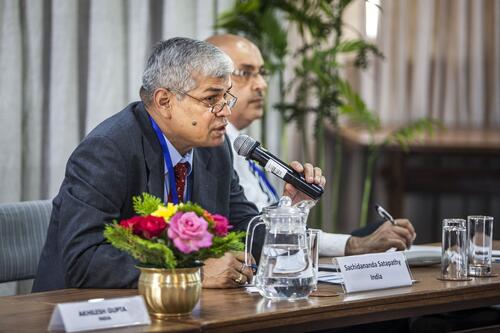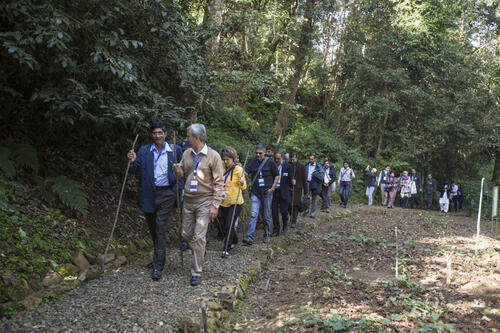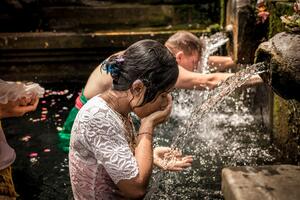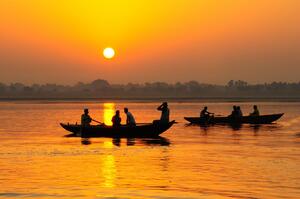|
Books
- Staples, James. Sacred Cows and Chicken Manchurian: The Everyday Politics of Eating Meat in India. Seattle: University of Washington Press, 2020.
- Drew, Georgina. River Dialogues: Hindu Faith and the Political Ecology of Dams on the Sacred Ganga. Tucson: The University of Arizona Press, 2017.
- Sharma, Mukul. Caste and Nature: Dalits and Indian Environmental Politics. New Delhi: Oxford University Press, 2017.
- Chapple, Christopher Key and Mary Evelyn Tucker, eds. Hinduism and Ecology: The Intersection of Earth, Sky, and Water. Cambridge, MA: Harvard University Press, 2000.


|
Journals & Articles
- Penizzotto, Denise. “Research Associate Tulasi Srinivas on Water, Gender, Caste, and Religion in Emerging Climate Justice and Sustainability Initiatives.” Harvard Divinity School. April 7, 2023.
- Koshi, Jacob. “India to stress ‘climate justice’ at COP 26 global summit: Environment Minister.” The Hindu. October 29, 2021.
- Crowe, Nicola. “Pollution and Religion: India’s Environmental Dilemma.” Student Think Tank on Europe-Asia Relations. June 10, 2021.
-
-
- Srinivas, Tulasi. “Bathing the Gods in Bottled Water?” Hinduism Today. October 1, 2020.
- Roy, Brototi. “India’s Environmental Justice Movements.” Center for the Advanced Study of India at the University of Pennsylvania. November 4, 2019.
- Swarnakar, Pradeep. “Climate Change, Civil Society, and Social Movement in India.” In India in a Warming World: Integrating Climate Change and Development, edited by Navroz K. Dubash. Oxford, UK: Oxford University Press, 2019.
- Balaji, Murali. “Hindu climate activists take lead on combating climate change.” YaleNews. February 15, 2019.
- Roy, Brototi and Joan Martinez-Alier. “Environmental Justice Movements in India: An analysis of the multiple manifestations of violence.“ Ecology, Economy and Society–the INSEE Journal 2 (1): 77–92, January 2019.
- MacNeil Jr., Donald G.”The Ganges Brims With Bacteria.” New York Times. December 23, 2019.
- Fici, Christopher. “Exploring the Dharmic Way to Think About Climate Change.“ The Wire. December 4, 2018.
-
-
- Dwivedi, O.P., and Lucy Reid. “Women and the Sacred Earth: Hindu and Christian Ecofeminist Perspectives.” Worldviews: Global Religions, Culture, and Ecology 11 (2007): 305–23.
- Misra, Shalini. “Spirituality, Culture and the Politics of Environmentalism in India.” The Journal of Entrepreneurship 16: 2 (2007).
- Agarwal, Anil. “Can Hindu Beliefs and Values Help India Meet Its Ecological Crisis?” In Hinduism and Ecology: The Intersection of Earth, Sky, and Water, edited by Christopher Key Chapple and Mary Evelyn Tucker, 165-179. Cambridge, MA: Harvard University Press, 2000.
- Alley, Kelly D. “Separate Domains: Hinduism, Politics, and Environmental Pollution.” In Hinduism and Ecology: The Intersection of Earth, Sky, and Water, edited by Christopher Key Chapple and Mary Evelyn Tucker, 355-387. Cambridge, MA: Harvard University Press, 2000.
- Apffel-Marglin, Frederique, and Pramod Parajuli. “'Sacred Grove' and Ecology: Ritual and Science.” In Hinduism and Ecology: The Intersection of Earth, Sky, and Water, edited by Christopher Key Chapple and Mary Evelyn Tucker, 291-316. Cambridge, MA: Harvard University Press, 2000.
- Basu, Pratyusha, and Jael Silliman. “Green and Red, Not Saffron: Gender and the Politics of Resistance in the Narmada Valley.” In Hinduism and Ecology: The Intersection of Earth, Sky, and Water, edited by Christopher Key Chapple and Mary Evelyn Tucker, 423-450. Cambridge, MA: Harvard University Press, 2000.
- Fisher, William F. “Sacred Rivers, Sacred Dams: Competing Visions of Social Justice and Sustainable Development along the Narmada.” In Hinduism and Ecology: The Intersection of Earth, Sky, and Water, edited by Christopher Key Chapple and Mary Evelyn Tucker, 401-421. Cambridge, MA: Harvard University Press, 2000.
- Gold, Ann Grodzins. “'If You Cut a Branch You Cut My Finger':Court, Forest, and Environmental Ethics in Rajasthan.” In Hinduism and Ecology: The Intersection of Earth, Sky, and Water, edited by Christopher Key Chapple and Mary Evelyn Tucker, 317-336. Cambridge, MA: Harvard University Press, 2000.
- James, George A. “Ethical and Religious Dimensions of Chipko Resistance.” In Hinduism and Ecology: The Intersection of Earth, Sky, and Water, edited by Christopher Key Chapple and Mary Evelyn Tucker, 499-530. Cambridge, MA: Harvard University Press, 2000.
- Lal, Vinay. “Too Deep for Deep Ecology: Gandhi and the Ecological Vision of Life.” In Hinduism and Ecology: The Intersection of Earth, Sky, and Water, edited by Christopher Key Chapple and Mary Evelyn Tucker, 183-212. Cambridge, MA: Harvard University Press, 2000.
- McGee, Mary. “State Responsibility for Environmental Management: Perspectives from Hindu Texts on Polity.” In Hinduism and Ecology: The Intersection of Earth, Sky, and Water, edited by Christopher Key Chapple and Mary Evelyn Tucker, 59-100. Cambridge, MA: Harvard University Press, 2000.
- Rao, K.L. Seshagiri. “The Five Great Elements (Pancamahabhuta): An Ecological Perspective.” In Hinduism and Ecology: The Intersection of Earth, Sky, and Water, edited by Christopher Key Chapple and Mary Evelyn Tucker, 23-38. Cambridge, MA: Harvard University Press, 2000.
- Shinn, Larry D. “The Inner Logic of Gandhian Ecology.” In Hinduism and Ecology: The Intersection of Earth, Sky, and Water, edited by Christopher Key Chapple and Mary Evelyn Tucker, 213-241. Cambridge, MA: Harvard University Press, 2000.
- Chandrasekhar, Sripati. “The Hindu Understanding of Population and Population Control.” In Ethical Perspectives on Environmental Issues in India, edited by George A. James, 189–216. New Delhi: A.P.H. Publishing Corporation, 1999.
- Abraham, C.M. “ENVIRONMENTAL JUSTICE IN INDIA: The manifestation of neo-dharmic jurisprudence in postmodern public law.” Dissertation. University of London, 1995.
- Gupta. “Ganga: Purity, Pollution, and Hinduism.” In Ecofeminism and the Sacred, edited by Carol J. Adams, 99–116. New York: Continuum, 1994.
|





